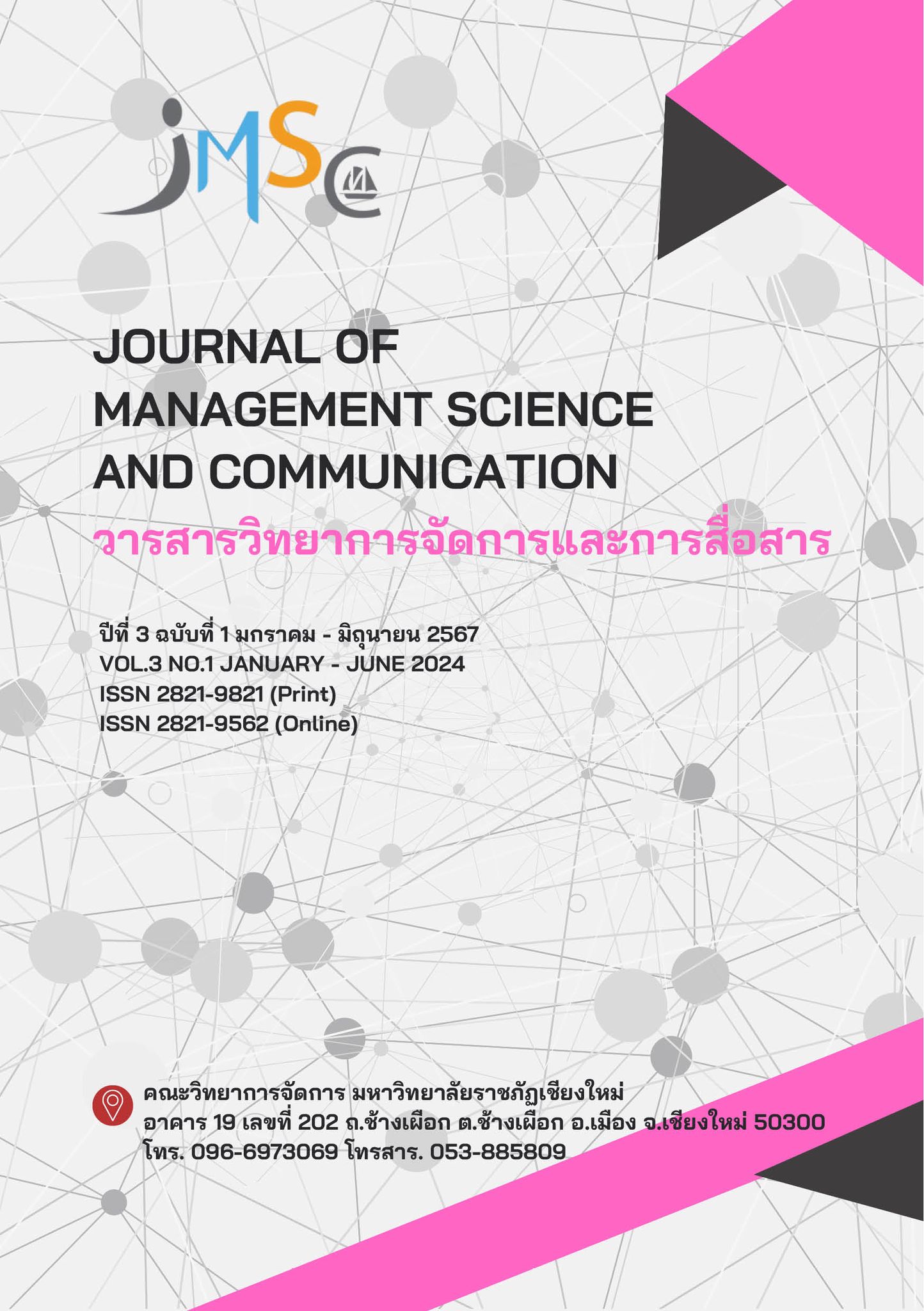Leadership Qualities Impacting Organizational Effectiveness
Main Article Content
Abstract
This article aims to study the characteristics of leaders that impact an organization's effectiveness. The methodology used in the study includes examining theories and concepts encompassing leadership theory, management by objectives and total quality control. The study concludes the following:
1) the characteristics of leaders play a pivotal role in fostering a collaborative work environment and guiding the organization towards success. Leaders possessing such traits significantly and sustainably influence the organization's effectiveness, 2) management by objectives is a process used to establish goals and objectives for the organization, serving as a framework for planning, execution, and evaluation. It provides guidelines for aligning actions towards achieving organizational goals and objectives, and 3) total quality management involves implementing a management system aimed at continuously improving the quality of products or services. It emphasizes the development of an organizational culture focused on continuous self-improvement to effectively adapt to changes and enhance efficiency.
The study's outcomes can be utilized to enhance and improve organizational management capabilities effectively and sustainably. This includes developing new knowledge regarding organizational operations, setting policies, and devising strategies to drive organizational success
Downloads
Article Details

This work is licensed under a Creative Commons Attribution-NonCommercial-NoDerivatives 4.0 International License.
References
กวี วงศ์พุฒ. (2539). ภาวะผู้นำ (พิมพ์ครั้งที่ 4). กรุงเทพฯ: บี.เค.อินเตอร์ปรินส์.
กัลยาณี สูงสมบัติ. (2550). เทคนิคการจัดการสมัยใหม่. กรุงเทพฯ: คณะบริหารธุรกิจ มหาวิทยาลัยเทคโนโลยีราชมงคลพระนคร.
กิตติยา มามีชัย. (2562). การศึกษาภาวะผู้นำเหนือผู้นำของผู้บริหาร สถานศึกษาสังกัดสำนักงานเขตพื้นที่การศึกษาประถมศึกษาจันทบุรี. [วิทยานิพนธ์ปริญญามหาบัณฑิต, มหาวิทยาลัยราชภัฏรําไพพรรณี]. https://etheses.rbru.ac.th/showthesis.php?theid=279&group=20&depid=3
คมศิลป์ ประสงค์สุข. (2564). รูปแบบการพัฒนาภาวะผู้นำครูด้านการประกันคุณภาพการศึกษา ของสถานศึกษาขั้นพื้นฐาน (รายงานการวิจัย). เชียงใหม่: มหาวิทยาลัยราชภัฏเชียงใหม่.
ชัญญานุช ประครองใจ และนันทิยา น้อยจันทร์. (2566). หลักการการบริหารงานตามวัตถุประสงค์ของผู้บริหารสถานศึกษา. การประชุมวิชาการและนำเสนอผลงานวิจัยระดับชาติ ครั้งที่ 5 (น. 808-815). มหาวิทยาลัยราชภัฏสวนสุนันทา.
เตือนใจ สุนุกุล. (2562). ภาวะผู้นำเชิงสร้างสรรค์ของผู้บริหารสถานศึกษาสังกัดสำนักงานเขตพื้นที่การศึกษามัธยมศึกษา เขต 2. [วิทยานิพนธ์ปริญญามหาบัณฑิต, มหาวิทยาลัยราชมงคลธัญบุรี]. http://www.repository.rmutt.ac.th/dspace/handle/123456789/3822
ต้นแก้ว ดามัง. (2565). การวิเคราะห์องค์ประกอบทักษะด้าน Soft Skills ของผู้บริหารสถานศึกษา สังกัดสำนักงานเขตพื้นที่การศึกษามัธยมศึกษา เขต 38. [วิทยานิพนธ์ปริญญามหาบัณฑิต, มหาวิทยาลัยราชภัฏอุตรดิตถ์]. http://202.29.52.112/dspace/bitstream/123456789/137/1/63551140111.pdf
น้ำฝน มงคลล้อม. (2564). การศึกษาการจัดการคุณภาพโดยรวมของผู้บริหารในโรงเรียนในเครือพระแม่มารีเขตกรุงเทพมหานคร. [สารนิพนธ์ปริญญามหาบัณฑิต, มหาวิทยาลัยศรีนครินทรวิโรฒ]. http://ir.swu.ac.th:8080/jspui/bitstream/123456789/99172/1/Namfon_M.pdf
มินตรา จันทร์เสถียร. (2559). การจัดการคุณภาพทั่วทั้งองค์การ. กรุงเทพฯ: ไทยวัฒนาพานิช.
ยาเบ็น เรืองจรูญศรี. (2552). แนวคิดทฤษฎีการบริหารเชิงสถานการณ์ (The Contingency Approach). http://www.kroobannok.com/blog/20420
วิโรจน์ ก่อสกุล. (2562). เอกสารประกอบการบรรยายกระบวนวิชาองค์การและนวัตกรรมในองค์การ. กรุงเทพฯ: มหาวิทยาลัยรามคำแหง.
เวิร์ค360. (ม.ป.ป.). คำคม แคปชั่นการเป็นผู้นำ Ep 1. https://work360.in.th/leader24/
ศรีสกุล เจริญศรี. (2558). ธรรมาภิบาล วัฒนธรรมองค์การ กับประสิทธิผลองค์การ ของหน่วยงานในสังกัดสำนักงานผู้บัญชาการตำรวจแห่งชาติ. [วิทยานิพนธ์ปริญญาดุษฎีบัณฑิต, มหาวิทยาลัยศรีปทุม]. http://dspace.spu.ac.th/handle/123456789/4903
สมจินตนา คุ้มภัย. (2553). การเปรียบเทียบวัฒนธรรมองค์การที่มีอิทธิพลต่อประสิทธิผลองค์การ: กรณีศึกษารัฐวิสาหกิจในประเทศไทย. [วิทยานิพนธ์ปริญญาดุษฎีบัณฑิต, สถาบันบัณฑิตพัฒนบริหารศาสตร์]. https://libdcms.nida.ac.th/thesis6/2553/b167375.pdf
สุธารัตน์ ไชยเทพ. (2552). การศึกษาปัญหาและการกำหนดกลยุทธ์เพื่อเพิ่มประสิทธิภาพการเคลมสินค้ากรณีศึกษาธุรกิจจำหน่ายติดตั้งลิฟท์และบันไดเลื่อน. [การค้นคว้าอิสระปริญญามหาบัณฑิต, ไม่มีตีพิมพ์].มหาวิทยาลัยหอการค้าไทย.
สุรีรัตน์ โตเขียว. (2560). รูปแบบภาวะผู้นำของผู้บริหารสถานศึกษาขั้นพื้นฐานในศตวรรษที่ 21. [วิทยานิพนธ์ปริญญาดุษฎีบัณฑิต, มหาวิทยาลัยราชภัฏนครสวรรค์]. https://tdc.thailis.or.th/tdc/browse.php
option=show&institute_code=6&bib=1334&doc_type=0&TitleIndex=1
เสกสรรค์ สนวา ฉัตรณรงค์ศักดิ์ สุธรรมดี และวิไลลักษณ์ ขาวสอาด. (2561). คุณลักษณะของผู้นำองค์การภาครัฐสมัยใหม่. วารสารมนุษยศาสตร์และสังคมศาสตร์ มหาวิทยาลัยราชภัฏสุรินทร์ [ฉบับพิเศษ], 20(2), 399-411.https://so03.tci-thaijo.org/index.php/jhssrru/article/view/153435/111791
Drucker, P. F. (1974). The Practice of Management. New York: Harper & Row.
Dubrin, A. J. (2010). Principle of leadership. (6th ed.). International Edition: South-Western.
Gardner, H. (1993). Multiple Intelligences: The Theory Inpractice. New York: Basic Books.
George, S. (1970). Training by Objective: An Economic Approach to Management, Training. New York: The McMillan Company.
Hoy, K. W., & Miskel, C. G. (1991). Education Administration: Theory, Research and Practice. New York: McGraw-Hill.
Reddin, W. J. (1970). Managerial Effectiveness. New York: McGraw-Hill Book Company.
Robbins, S. P. (1990). Organization Theory: Structure. Design and Applications. New Jersey: Prentice-Hall.
Smircich, L. & Morgan, G. (1982). Leadership: The Management of Meaning. Journal of Applied Behavior Science. 18(3), 257-273.
Stogdill, R. (1974). Handbook of Leadership. New York: The Free Press.
W.Edwards Deming. (1982). The Deming Theory of Management. Academy of Management Review, 13(1), 138.
Yukl, G. (2002). Leadership in organization. New Jersey: Prentice-Hall.


